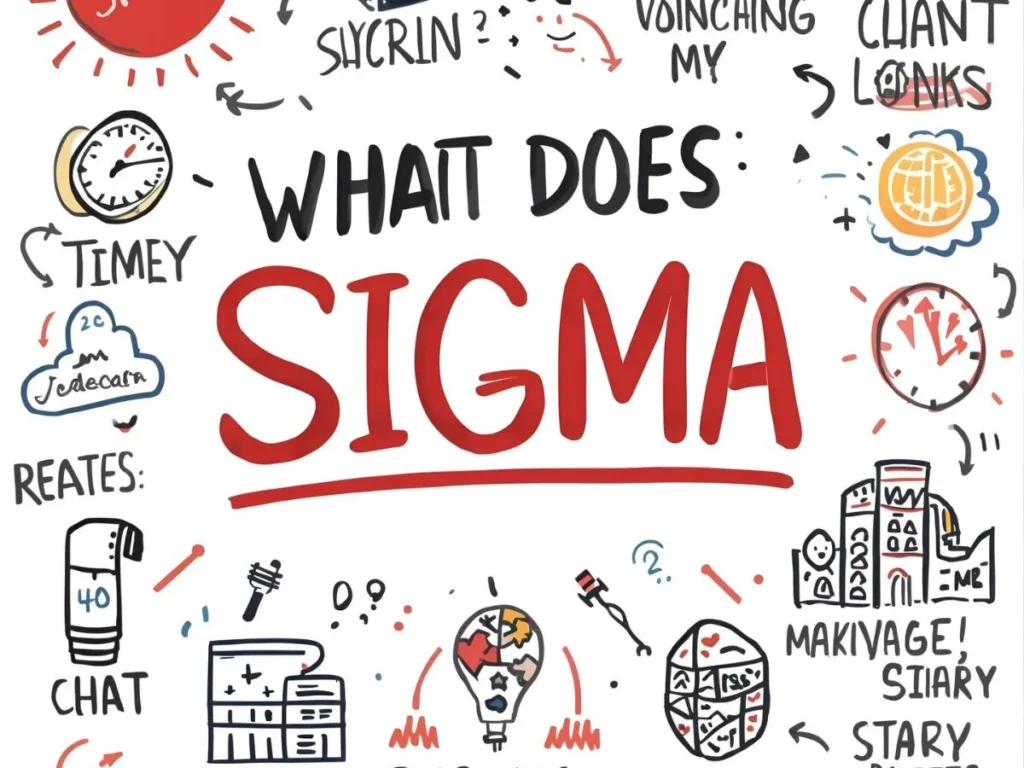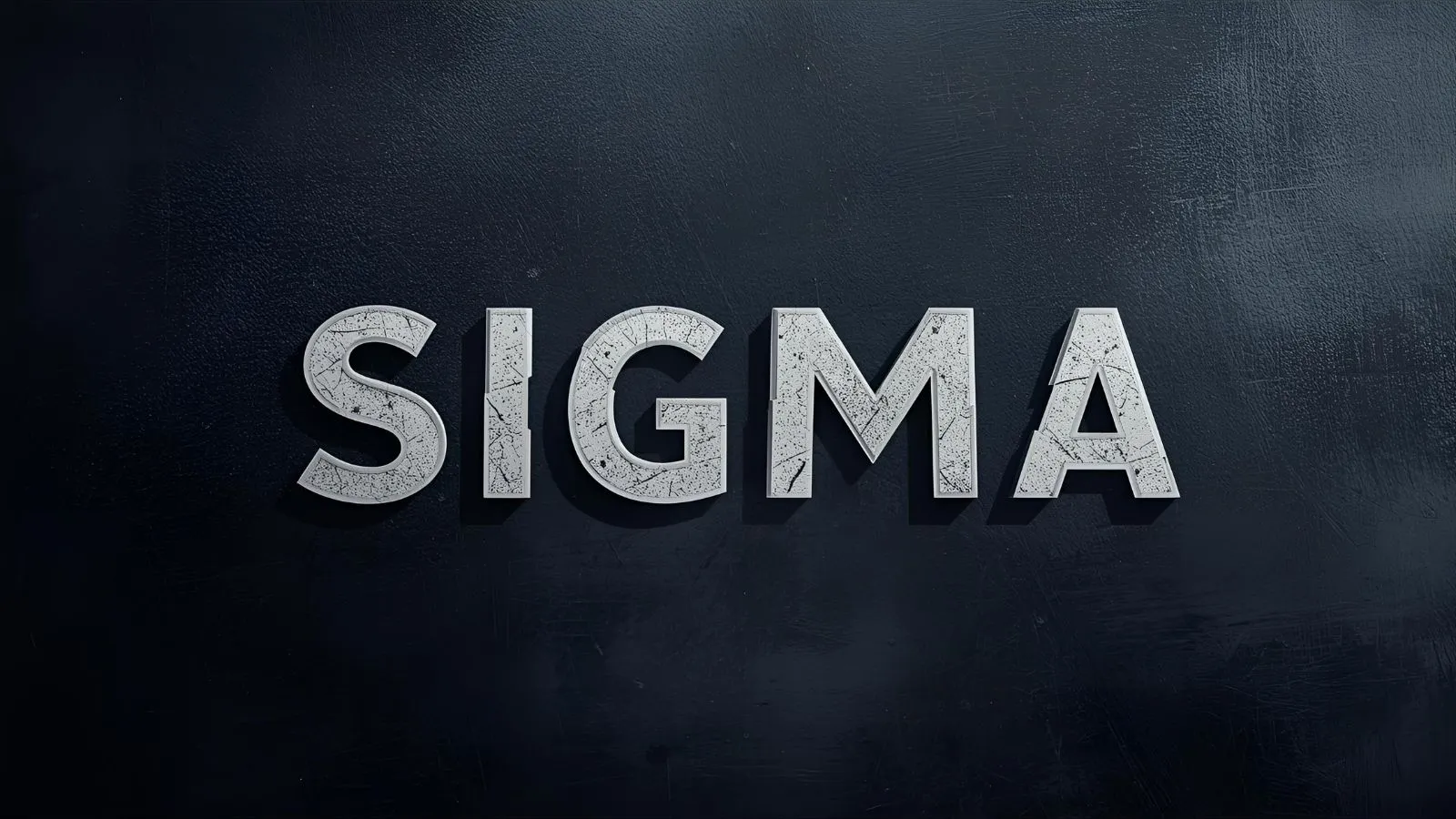Language is a living organism. It breathes, shifts, and evolves with every new generation, cultural trend, and online platform. One of the clearest examples of this evolution is the rise of “Sigma” as slang—a term that has traveled from academic circles in psychology and mathematics to TikTok memes, motivational podcasts, and everyday text conversations.
But what exactly does Sigma mean in slang today, in 2025? Is it still tied to the “Sigma Male” concept, or has it broadened into something more flexible, nuanced, and socially meaningful? In this article, we’ll dive deep into the origins, transformations, and real-life applications of Sigma slang, while offering you polite, professional, and casual alternatives for different contexts.
This guide goes beyond the superficial definitions you’ll find scattered online. Here, you’ll get a fully comprehensive, 2025-updated explanation of Sigma—why people use it, how its meaning has shifted, and how you can incorporate it naturally (or avoid it when necessary).
1. Origins of Sigma: From Greek Letters to Social Archetypes
To understand slang, you first need to trace it back to its roots. The word “Sigma” comes from the Greek alphabet (Σ, σ, ς), where it represents the letter S. Traditionally, it carried no cultural meaning beyond its place in the alphabet.
The modern slang usage, however, is linked to the socio-psychological archetype system that started with the “Alpha” and “Beta” male classifications. These terms gained traction in the early 2000s, popularized by online communities and pseudo-scientific discussions around dominance, personality, and social hierarchy.
- Alpha Male: Seen as dominant, outgoing, leader-like.
- Beta Male: Viewed as more passive, agreeable, or submissive.
- Sigma Male: Introduced later as an outsider archetype—someone equally strong and confident as an Alpha, but independent, mysterious, and non-conforming.
By 2020–2022, this concept spread like wildfire on TikTok, YouTube, and Reddit. Motivational content creators, meme-makers, and influencers latched onto the Sigma archetype, branding it as the lone wolf personality: confident, self-reliant, and detached from social validation.
By 2025, however, “Sigma” has gone beyond male archetypes. It’s now used in gender-neutral slang, professional contexts, and casual texting to mean cool, independent, detached, or admirable in a self-contained way.
2. What Does Sigma Mean in Slang (2025 Definition)?

In modern 2025 slang, Sigma means someone who succeeds or stands out without needing to follow traditional paths, group approval, or loud self-promotion.
It implies:
- Self-reliance: Thriving without external validation.
- Non-conformity: Not bending to trends, yet still admirable.
- Calm dominance: Having quiet influence, not loud authority.
- Mystique: Being hard to read, unpredictable, or intentionally private.
Examples in conversation (2025):
- Texting: “He didn’t even argue, just walked away and won the deal. Total sigma move.”
- Casual chat: “She runs her business alone and never chases clout. That’s so Sigma.”
- Meme: A picture of someone ignoring drama with the caption: “Sigma mindset.”
In short: Sigma = quiet strength, admired independence, and cool detachment.
3. How Sigma Has Shifted Since 2020
Many people misunderstand Sigma as just a recycled “Alpha.” But its meaning has shifted considerably:
- 2020–2021: Primarily tied to “Sigma Male” memes. Often exaggerated, joking, or dismissive.
- 2022–2023: Became mainstream; motivational coaches used it in branding.
- 2024: Expanded into casual slang beyond gender. “Sigma” became shorthand for calm confidence or unbothered behavior.
- 2025: It’s no longer confined to masculinity or hierarchy. Sigma is now gender-neutral, global slang, even appearing in workplace culture (e.g., describing leadership styles).
4. Why Sigma Resonates in 2025
Slang survives only if it resonates with cultural needs. Sigma thrived because it reflects modern values:
- Digital burnout – People admire detachment from constant social media validation.
- Independence culture – Freelancing, remote work, and solo entrepreneurship have grown. Sigma fits this lifestyle.
- Desire for authenticity – In an era of filters and performativity, Sigma signals realness without shouting about it.
- Gender-neutral empowerment – Sigma appeals across identities, not just “men.”
5. Polite, Professional, and Casual Alternatives to “Sigma”

Since slang doesn’t always fit formal contexts, here are 10 polished alternatives for Sigma that you can use depending on tone and situation.
1. Independent Thinker
- Polite/Professional: “She’s an independent thinker who doesn’t rely on group approval.”
- Casual: “Bro’s just built different—total independent thinker.”
2. Self-Reliant
- Professional: “His self-reliant approach makes him effective in leadership roles.”
- Casual: “She doesn’t need anyone to back her up. Self-reliant energy.”
3. Unbothered
- Professional: “He remains calm and unbothered under stress.”
- Casual: “They tried to roast him, but he stayed unbothered. Sigma vibes.”
4. Lone Wolf
- Polite: “She thrives as a lone wolf—independent yet capable.”
- Casual: “That was a lone wolf move, man.”
5. Composed Leader
- Professional: “A composed leader inspires trust without theatrics.”
- Casual: “She’s too composed to even react—respect.”
6. Self-Assured
- Professional: “His self-assured nature makes negotiations smoother.”
- Casual: “She walked in like she owned the place—self-assured for real.”
7. Detached but Effective
- Professional: “He maintains a detached but effective stance in decision-making.”
- Casual: “Didn’t even care and still won—detached but effective.”
8. Quietly Influential
- Professional: “She’s quietly influential, guiding outcomes without showmanship.”
- Casual: “Low-key runs the room—quietly influential.”
9. Resilient
- Professional: “Resilient leadership defines long-term success.”
- Casual: “He doesn’t break. Resilient, straight Sigma.”
10. Authentic
- Professional: “Authentic leadership earns respect.”
- Casual: “No fake energy. Just authentic.”
6. How to Use “Sigma” Correctly in Different Contexts
One of the biggest risks with slang is misusing it. Let’s break down when Sigma fits and when it doesn’t.
- In casual texts: Totally fine.
- In professional emails: Avoid slang—use alternatives like “self-reliant” or “independent thinker.”
- In social media posts: Works best in memes, reels, or motivational content.
- In formal essays/reports: Not appropriate unless analyzing slang linguistically.
7. The Psychology Behind Sigma
Psychologists note that Sigma resonates because it romanticizes introversion. Unlike Alpha, which glorifies dominance, Sigma glorifies autonomy and inner validation.
This is particularly appealing in 2025 because:
- Introverted leadership styles are being recognized as valuable.
- Social media fatigue makes detachment look powerful.
- Younger generations admire subtle influence over loud dominance.
8. Sigma in Popular Culture (2025 Examples)
- TikTok Trends: Clips labeled “Sigma move” often show people staying calm under chaos.
- Music Lyrics: Rappers and pop artists reference Sigma energy as unbothered coolness.
- Workplace Culture: Companies now use “Sigma leadership” to describe calm, independent decision-making.
9. Is Sigma Always Positive?
Not necessarily. Like all slang, Sigma can be used sarcastically or critically:
- Positive use: “She didn’t chase anyone, still got success. Sigma.”
- Negative use: “He ghosted everyone and called it Sigma. That’s just selfish.”
The nuance depends on tone, context, and relationship between speakers.
10. The Future of Sigma (2026 and Beyond)
Will Sigma survive, or fade like other slang? Based on 2025 data:
- Sigma is evolving into a mainstream term for independence and calm leadership.
- It’s unlikely to vanish soon because it satisfies deep cultural needs.
- However, meanings will keep broadening—possibly detaching entirely from its “male archetype” roots.
Expect Sigma to eventually stand for any admired form of self-contained strength, regardless of gender, profession, or culture.
Conclusion
In 2025, Sigma is more than just a meme. It’s a powerful slang term that encapsulates independence, resilience, calm confidence, and unbothered strength.
While it started as a male archetype concept, it has now grown into a universal descriptor admired across genders and cultures.
Whether you use Sigma in casual texts, motivational content, or professional settings (via alternatives like independent thinker or self-reliant), the key is understanding tone and context.
Slang is never static. And Sigma, with its flexible, empowering, and subtle appeal, is here to stay—at least for the foreseeable future.










